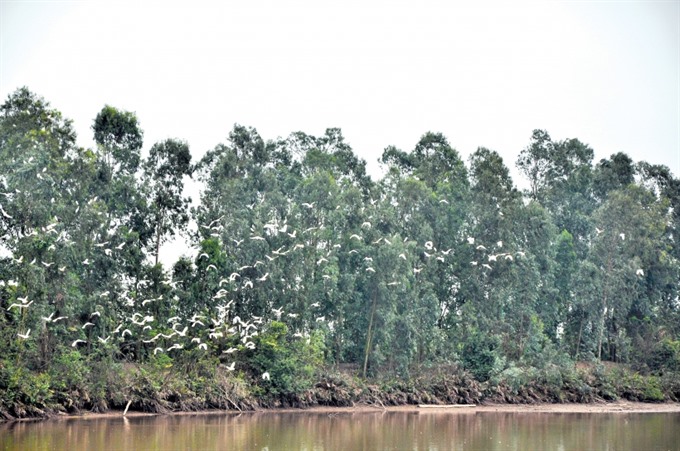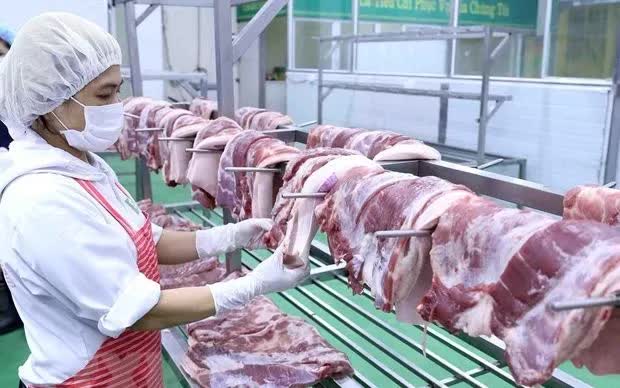 Society
Society

During the past 30 years, he spent his time to protect wild birds strictly. He’s Bùi Thanh Bảy, or often called Bảy Stock, from Hoành Quan Village, Thụy Liên Commune, Thái Thụy District in the northern province of Thái Bình.
 |
| Over the past 30 years, Bùi Thanh Bảy from Hoành Quan Village, Thụy Liên Commune, Thái Thụy District in the northern province of Thái Bình has protected wild birds.— Photo baothaibinh.com.vn |
THÁI BÌNH — Wild birds are rare and valuable specialities in Việt Nam, so many restaurants serve dishes made from wild birds.
It is also a means of subsistence for bird hunters and a popular snack after a long day of drinking.
But Bùi Thanh Bảy, also known as Bảy Stork, has never hurt wild birds. Over the past 30 years, the man from Hoành Quan Village, Thụy Liên Commune, Thái Thụy District in the northern province of Thái Bình has protected wild birds.
Resuscitation
Local residents are no stranger to Bảy Stork. People call him the “wild stork protector”, he’s so well-known and it’s not tough to find him. His field can be seen from far away with it’s abundant green trees and white spots - storks which gather on the trees. They make nests and live here, some for as long as 30 years.
The reason they have lived here for so long is interesting one.
The stork garden is like an ecological zone, about 7ha with a fish pond, eucalyptus trees, coconut trees and fruit trees as home for the storks.
Bảy believes the storks here are a valuable present from God, so people must protect them.
Bảy said that the land here is good now, but in the past it was dead land. In 1989, it was salt-marsh land, useless for farming. But when the Thụy Liên Co-operative called for people to reclaim the land, Bảy and his wife decided to take 7ha.
“Many people thought that my wife and I were mad and stupid,” Bảy said.
Without capital and limited knowledge, Bảy and his wife were determined to heal the land. The couple spent uncountable days digging and making mounds to keep out the tide.
Then the couple divided the land into different ponds to raise aquatic animals.
To prevent landslides, Bảy and his wife planted more than 4,000 eucalyptus and 600 coconut trees.
After several months, the formerly useless land became a farm. Cages, ponds and the system of channels, gardens were set up, turning the wild land into an abundant farm.
Storks return
Bảy is happy when he sees the wild storks swarm the trees.
In 1989, while Bảy and his wife were planting eucalyptus tress, they found hundreds of storks flying into their farm.
“At first I intended to cast them out as I was afraid they would harm my trees. But after that I thought they would only return if my land was good, so I decided to let them be free,” he said.
More and more storks came to Bảy’s farm.
“I remind everybody not to cast them out, or shoot them. Let them have a natural living area,” said Bảy.
Bảy does worry that the storks will eat all of shrimps and fish in his ponds. But the storks seem to understand him. They search for food in other places, and return to his farm at night.
Bird catchers started to notice the storks in Bảy’s farm, so Bảy and his wife decided to plant more and more eucalyptus and coconut trees to cover the farm.
“The trees will be a safe living area for the storks and protect them from bullets from hunters,” he said.
Bảy is not sure how many storks and what kinds of storks come to his farm. He only knows that many of them are rare and valuable species that need protection.
In debt due to storks
After nearly 30 years of protecting the wild storks, Bảy is familiar to the storks. He can walk among them without agitating them. But whenever a stranger comes, the storks fly away.
“Many times I was so poor so that I intended to sell some of the trees. But then I did not have the heart to do that, because if I sell the trees, where will the storks live?” he said.
Bảy has to work hard to protect the storks from hunters.
Once, at 1am, Bảy jumped when he heard gunshots and the storks squawking. He woke up and saw a number of hunters intending to shoot the storks. Bảy rushed in to stop them.
“The hunters threatened me, saying the storks were wild and did not belong to me so I did not need to protect them,” Bảy said.
Then Bảy explained to the hunters that people needed to protect nature, and threatened to call the police. And the hunters went away.
“Many people believe that I’m mad to raise wild storks. But I’m happy protecting them. I can be physically poor, but spiritually rich,” he said. — VNS




